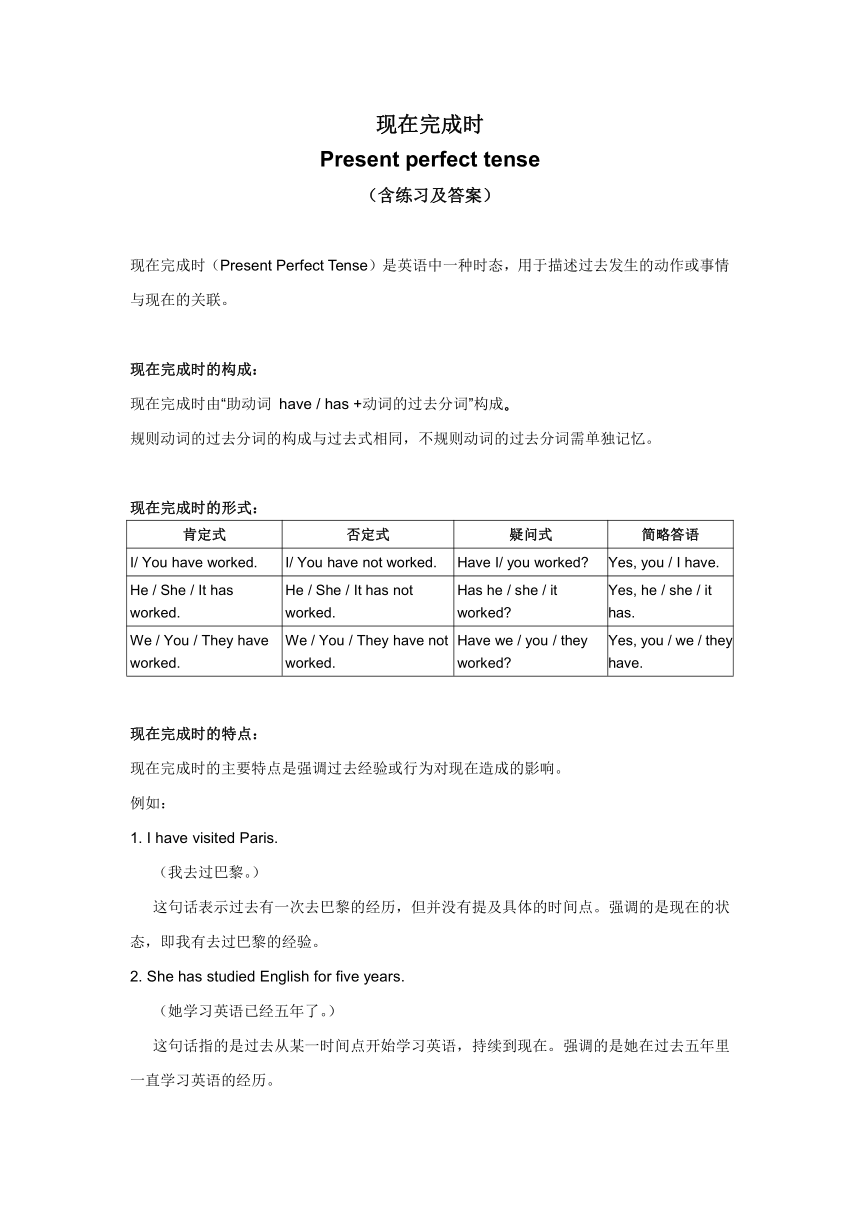
现在完成时 Present perfect tense (含练习及答案) 现在完成时(Present Perfect Tense)是英语中一种时态,用于描述过去发生的动作或事情与现在的关联。 现在完成时的构成: 现在完成时由“助动词 have / has +动词的过去分词”构成 规则动词的过去分词的构成与过去式相同,不规则动词的过去分词需单独记忆。 现在完成时的形式: 肯定式 否定式 疑问式 简略答语 I/ You have worked. I/ You have not worked. Have I/ you worked Yes, you / I have. He / She / It has worked. He / She / It has not worked. Has he / she / it worked Yes, he / she / it has. We / You / They have worked. We / You / They have not worked. Have we / you / they worked Yes, you / we / they have. 现在完成时的特点: 现在完成时的主要特点是强调过去经验或行为对现在造成的影响。 例如: 1. I have visited Paris. (我去过巴黎。) 这句话表示过去有一次去巴黎的经历,但并没有提及具体的时间点。强调的是现在的状态,即我有去过巴黎的经验。 2. She has studied English for five years. (她学习英语已经五年了。) 这句话指的是过去从某一时间点开始学习英语,持续到现在。强调的是她在过去五年里一直学习英语的经历。 3. They have finished their homework. (他们完成了作业。) 这句话表示过去发生的动作,即他们已经完成了作业,且与现在有关联,即作业的完成状态。 4. We haven't seen each other for a long time. (我们已经很久没见面了。) 这句话强调从过去某一时间点开始到现在的时间段内,我们没有见面的情况。 5. Have you ever been to Japan (你去过日本吗?) 这句话用来询问过去是否有过去日本的经历,强调的是与现在相关的经验。 现在完成时的用法: 用法 例句 表示过去发生或已经完成的某一动作对现在造成的影响或结果。 —Have you found him yet —No, he has probably gone home.(现在不在这里) 表示开始于过去并持续到现在的动作或状态,可以和表示从过去某一时刻延续到现在(包括“现在”在内)的一段时间的状语连用。 I haven’t seen her these days. He has taught us since I came to this school. How long have you been like this I have been like this since last month. She has lived here for three years. 现在完成时可以和 just, already, yet, ever, never, before 等词连用。 I’ve just called you. She has already finished it. Has Kangkang come back yet Have you ever cooked at home I have never seen such a beautiful place before. have / has been to 和 have / has gone to 的区别: have / has been to 表示“曾经到过某地” have / has gone to 表示“已经去某地了”。 —Where have you been —I have been to Beijing.(去过北京,已经回来) —Where is Jane —She has gone to Beijing.(去北京了,不在此处) 短暂性动词的完成时态 短暂性动词的完成时态不能和表示一段时间的时间状语连用。 当短暂性动词需要与表示一段时间的时间状语连用时,通常要进行词语转化。 例如: buy — have come — be get to know — know begin — be on catch a cold — have a cold marry — be married borrow — keep die — be dead leave — be away(from) close — be closed fall ill — be ill join — be a member of / be in 又如: The film has been on for half an hour.(正) The film has begun for half an hour.(误) The bookstore has been closed since last month.(正) The bookstore has closed since last month.(误) 注意: 短暂性动词的完成时态在否定句中可以和表 ... ...
~~ 您好,已阅读到文档的结尾了 ~~